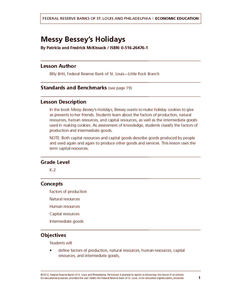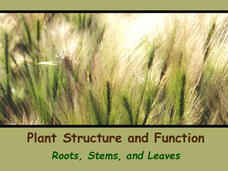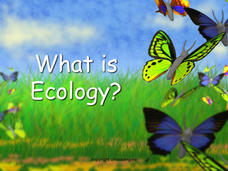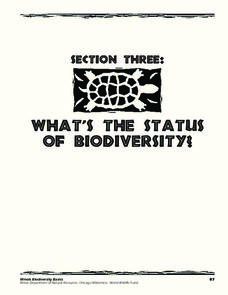K12 Reader
Natural Resources
What natural resources are available in your area? Your learners can consider this question after reading a brief passage about natural and renewable resources. After reading, class members respond to five questions related to the reading.
Federal Reserve Bank
Messy Bessey's Holidays
Teach your class some fairly complex terms—factors of production, human resources, capital resources, natural resources, and intermediate goods—with a storybook (Messy Bessey's Holidays), plenty of visuals and handouts, and related...
K12 Reader
Habitat Destruction
What happens when an animal becomes endangered or extinct? Explore the ways that human influence throughout the environment has threatened the existence of other species with a reading passage. After reading the paragraphs, kids answer...
Biology Junction
Plant Structure and Function: Roots, Stems, and Leaves
Scientists found fossils of plants more than 420 million years old—but plants existed for up to 100 million years prior to these fossils. Learn about the importance of plants to the entire planet. Viewing a presentation helps scholars...
Wild BC
Is Climate Change Good for Us?
Is it really that big of a deal if the global climate undergoes a little change? Young environmentalists consider this very question as they discuss in small groups the impact of different climate change scenarios on their lives,...
Curated OER
Lord of the Flies Anticipation Guide and Activities
“What are we? Humans? Or animals? Or savages?” Ah, the central question of Lord of the Flies. As part of their study of William Golding's riveting novel, readers complete an anticipation guide and respond to a series of survey...
Biology Junction
What Is Ecology?
Do you know the name for the biological study of interactions? A short presentation with accompanying worksheet introduces individuals to ecology. The materials offer a broad overview of the subject and the levels of organization to...
Loudoun County Public Schools
Figurative Language Packet
A definitive resource for your figurative language unit includes several worksheets and activities to reinforce writing skills. It addresses poetic elements such as simile and metaphor, personification, hyperbole, and idioms, and...
International Technology Education Association
Become a Weather Wizard
Accurate weather forecasting is something we take for granted today, making it easy to forget how complex it can be to predict the weather. Learn more about the terms and symbols used to forecast the weather with an earth science lesson...
Curated OER
How Fast is Usain Bolt?
Revisit the 2012 Summer Olympics by having seventh graders calculate the unit rate sprinting speed of the 100-meter gold medal winner.
American Museum of Natural History
Beyond Planet Earth
Scholars take a journey through space with 16 eye-catching images. Along the way, learners read captions starting with the moon, then move onto asteroids, Mars, and Jupiter.
Agriculture in the Classroom
A Rafter of Turkeys
How did that turkey get from the early Aztec culture to your table? Learn about the history of wild and domesticated turkeys in North America, as well as their inclusion in Thanksgiving traditions, with a two-part agricultural science...
Illinois Department of Natural Resources
Section Three: What's the Status of Biodiversity?
Biodiversity is essential for every habitat, but many species are at risk due to pollution and other factors. Explore several different species native to Illinois in a gallery walk with posters that learners have created after research...
Edutopia
Edutopia: Goods and Services [Pdf]
A unit that teaches the difference between goods and services, the difference between producers and consumers, the difference between human, natural, and capital resources, and the difference between bartering/trading and buying/selling....
CommonLit
Common Lit: Themes: Morality: Why Do People Do Bad Things?
This is a collection of Grade-Leveled texts (3-12) to address the question Morality: Why do people do bad things? Select a grade level and a collection of on grade-level reading passages on the topic comes up. [Free account registration...
CommonLit
Common Lit: Excerpt From "Self Reliance" by Ralph Waldo Emerson
The Transcendentalist movement of the 1820s-1830s promoted the ideas of intuition, independence, and inherent goodness in humans and nature. This excerpt comes from Emerson's most famous essay. "Self-Reliance," which discusses similar...













![Edutopia: Goods and Services [Pdf] Activity Edutopia: Goods and Services [Pdf] Activity](https://d15y2dacu3jp90.cloudfront.net/images/attachment_defaults/resource/large/FPO-knovation.png)